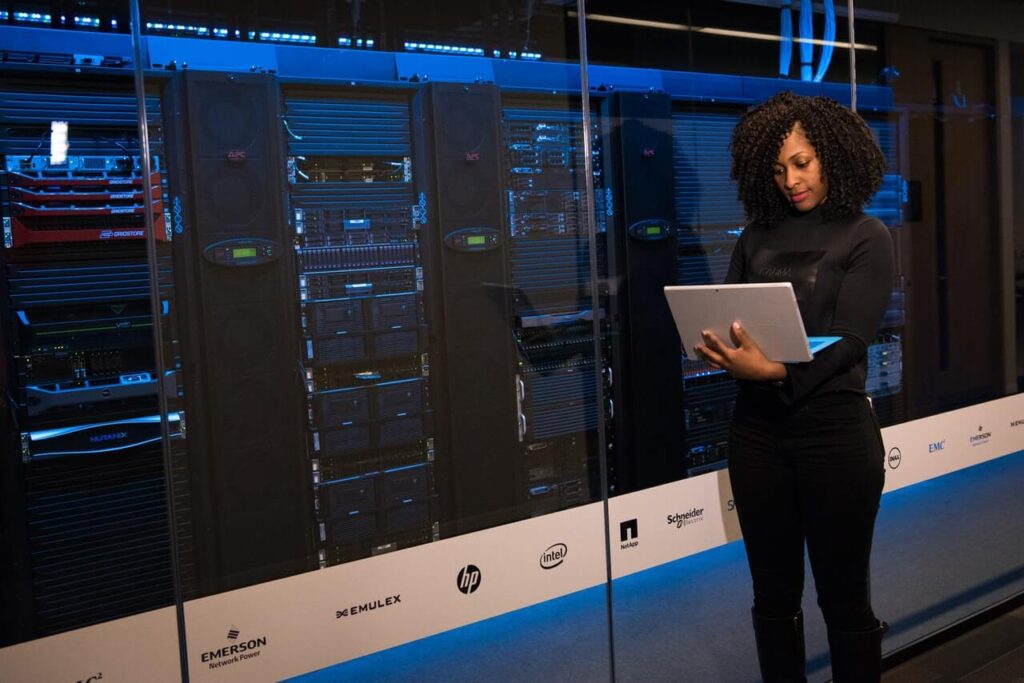Cybersecurity is poised to be one of the biggest challenges enterprises face in the 21st century, and one that they’re shockingly underprepared for. Consider this. It’s the fastest growing form of crime in the U.S. 92% of North American companies experienced a distributed denial of service (DDoS) attack in 2018, costing businesses over $10 billion each year. Cyberattacks are estimated to cost the world $6 trillion in 2021, and small businesses are a particularly ripe target. As many as 25% of SMBs targeted by hackers in 2019 filed for bankruptcy.
Business communications are particularly vulnerable to breaches, considering they involve connections to and from your company. A poor IT security net can be easily exploited and confidential data can be compromised.
Your communication systems should not only be able to withstand these attacks, but also have security measures in place to prevent potential snoops from even trying. If you haven’t yet made the transition from traditional landlines to VoIP, this is a compelling reason to do so.
VoIP can be the most secure phone service for any business. And the best part is, with the right partner, your entire communications setup, including security maintenance, can be managed by your VoIP service provider. If you’re not sure what VoIP communications are all about, here’s everything you need to know about a VoIP phone system.
In general, voice over internet protocol (VoIP) enables your enterprise to leverage unified communications (UC), managed through one secure interface. Wildix VoIP, Class5 Technologies’ core communication platform of choice, is just such a solution, and is secure-by-design. This means all your communications are hosted in a protected environment, regardless of how many employees or people it needs to support. Wildix hosting is HIPAA-compliant, ensuring maximum protection for sensitive data.
A genuinely secure VoIP communications service has certain security elements built in that make it difficult to breach.
Here are the primary security features of a VoIP system, all of which are default in Wildix.
Encryption
Good encryption is the hallmark of any secure VoIP service. A number of cyberattacks often forgo total system access for the ability to eavesdrop on ongoing communications. This is why ‘encryption’ or scrambling of transmitted data is so important, so that even if it happens to land in the wrong hands, it’s akin to gibberish for those who aren’t authorized to access it.
There are three components of encryption:
- Transport Layer Security (TLS) should be used as a default by any system, which ensures only the authorized parties are able to decipher the data being shared. This allows for encrypted paths between onsite hardware and the PBX.
- Secure real-time transport protocol (SRTP) is used to encrypt paths that are browser-based or within the cell phone app back to the PBX. Wildix implements secure real-time protocol (SRTP) encryption, which converts communication into coded data, with the decoding keys only available to the involved users.
- An advanced encryption standard (AES) encryption is used for the database itself within the PBX.
On Wildix PBX, all communication, including voice, video, text, screenshare, and filesharing is encrypted by default. Although encryption by itself cannot prevent the act of eavesdropping, it can defang it and contribute to secure VoIP communications.
DDoS Protection
Distributed denial of service (DDoS) attacks involve an excessive volume of web traffic being deliberately directed at a particular web server with the intention of overloading and crashing it. Secure VoIP systems will have a mechanism to police incoming traffic and outright blocking traffic from suspicious IP addresses to prevent undermining platform capability.
In phone systems, DDoS does not usually allow access to the system: it floods a phone system with innumerable packets that the phone system cannot function during the attack.
At Class5 Technologies, our systems have active firewalls that, when an unauthorized login, registration, or even a DDoS attempt is made, the source’s IP address is completely blocked for a predetermined amount of time.
WebRTC Architecture
Any UC platform based on the web real-time communication (WebRTC) framework has inherent security advantages over other systems. For starters, WebRTC functions through your web browser, independent of any external plugins or software. Not only does this protect against malware-embedded plugins or downloads, it also offers a buffer against any security vulnerabilities or infections that exist on the user’s own device. A WebRTC-led VoIP service is secure since it’s updated quickly and doesn’t depend on user permissions to update to the latest versions. This means newly identified vulnerabilities can be easily protected against via a new security patch.
2-Factor Authentication (2FA)
Access control is a very important part of any security system. Weak or easily guessed passwords are a glaring vulnerability. This is why secure VoIP platforms enforce the requirement of a strong password. They must also be stored in a secure, encrypted way, to prevent illicit data mining. Even then, determined hackers may attempt brute force to guess a password, where every conceivable combination of characters is used to eventually hit upon the right password. This too can be prevented by enforcing a maximum number of failed attempts for every IP address.
Security can be further strengthened by requiring users to enter in a one-time code sent to their email or cell phone, in addition to their password. This is called 2-factor authentication and significantly reduces the chances of a security breach, since hackers would also need to be able to access the user’s device or email. Enabling 2-factor authentication is considered best practice across every touch-point of your company’s infrastructure, whether it’s your phone systems, your employees’ mobile devices, computers, or laptops.
Visibility and Vigilance
Being able to actively monitor any UC platform is critical for system admins. VoIP platforms like Wildix automatically deliver alerts for external security breaches as well as internal attacks. Wildix also allows integration with a robust external monitoring tool like Zabbix for an even better, heightened level of security for handling potential system intrusions.
It’s not for nothing that experts consider VoIP the most secure service for business communications. It’s harder to physically interfere with and carries multiple security redundancies to effectively protect against cyberattacks.
If you’d like to know more about the security challenges that threaten the business communications landscape, our experts are just a call away. We’ll be happy to analyze your setup and walk you through the steps you need to plug the gaps in your security.


